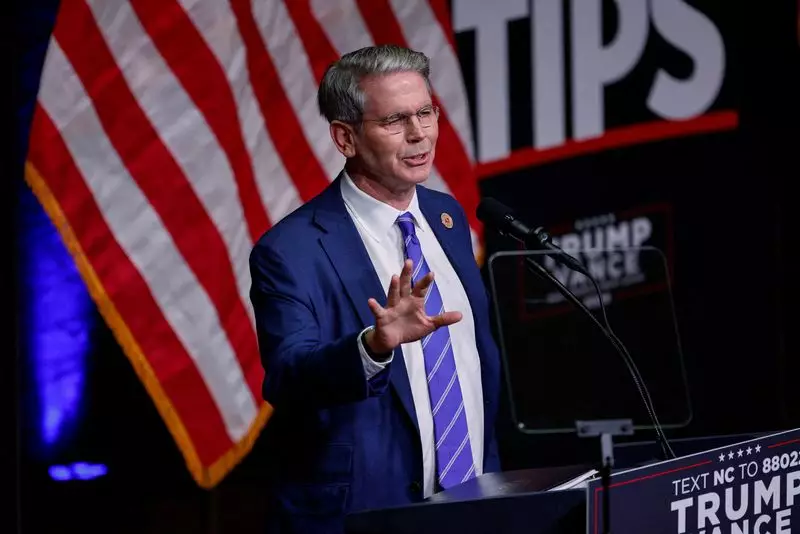The nomination of Scott Bessent as U.S. Treasury Secretary marks a pivotal moment in American economic leadership, signaling changes that could reverberate through global financial markets. President-elect Donald Trump’s announcement culminated a week of speculation involving high-profile contenders, showcasing the intense political maneuvering that often accompanies such appointments. Bessent, a seasoned investor with a formidable background in finance, is expected to shape economic policy significantly as he takes on the responsibilities of overseeing the world’s largest economy.
Bessent’s nomination follows a prolonged period of discussions and comparisons among other potential candidates, including notable figures from Wall Street and government. The twists and turns in this selection process illustrate the high stakes involved and the palpable anticipation from financial institutions regarding Trump’s administration’s priorities. Wall Street’s watchful eyes zeroed in on Bessent not merely for his pedigree, but also for his understanding of market dynamics and his inclination toward more moderate trade policies.
Experiences that Shape Policy
Bessent’s career is steeped in experience with major financial players like George Soros and Jim Chanos, along with running his own hedge fund. This rich history provides him with unique insights into the realities of market functioning and regulatory impacts. His perspectives on tax reform and deregulation could incite a fresh wave of economic activity, particularly in sectors like banking and energy.
In his role as Treasury Secretary, Bessent will need to navigate complex economic challenges, including managing the increasing federal deficits projected to escalate due to Trump’s tax reforms and potential new fiscal policies. The anticipated economic growth should, ideally, mitigate some pressure on revenue streams; however, the risk of inadequate fiscal balancing could linger, complicating his term.
Balancing Tariffs and Growth
Though Trump’s administration has previously signaled a willingness to embrace steep tariffs as a part of its larger economic strategy, Bessent’s appointment could evidence a shift toward a more measured approach. Experts have noted that his orientation leans toward fostering economic relationships rather than imposing protectionist measures. This could potentially alleviate tensions in international trade relations while still pursuing domestic growth initiatives.
The consideration of market behavior following Trump’s election highlighted Bessent’s ability to identify economic anomalies. His take on the election results challenged the prevailing pessimism among analysts, which not only earned him respect among investors but also marked him as a practical choice for Treasury Secretary. His vision for revitalizing the economy, characterized by increased lending and production, aligns with Trump’s broader economic agenda but emphasizes a need for careful execution given the delicate nature of the current global economic climate.
As Treasury Secretary, Bessent’s responsibilities extend beyond domestic economics; he will also play a critical role in shaping U.S. foreign economic policy. The evolving situation in Ukraine, following Russia’s invasion, presents an immediate challenge wherein Bessent must balance Trump’s inclination for a swift resolution with ongoing U.S. support for Ukraine’s economy. This dichotomy is a nuanced aspect of his new role, necessitating diplomatic finesse alongside economic strategy.
Moreover, Bessent’s stance on climate change and environmental policy will likely contrast sharply with the previous administration’s objectives. Trump has consistently expressed skepticism regarding climate initiatives, hinting at a shift back to fossil fuels and diminishing support for renewable energy projects. How Bessent reconciles these positions with the urgent recommendations of financial regulators and agencies that lean towards sustainable practices will be crucial.
Bessent’s relationship with the Federal Reserve will also be a focal point of his tenure as Treasury Secretary. The Treasury and the Fed traditionally collaborate closely to implement monetary policy effectively. Post-election discussions indicated Bessent’s earlier contemplation of proposing a “shadow” Fed chair to alleviate tensions in this relationship. However, as Trump’s economic agenda solidifies, so too will the necessity for cohesive communication between these two pivotal financial bodies.
As Bessent steps into this influential role, his ability to navigate the intersection of fiscal policy, regulatory reform, and geopolitical relations will be paramount. The economic strategies he advocates can reshape not only domestic financial landscapes but also influence global economic paradigms in an increasingly interconnected world. His success as Treasury Secretary may ultimately hinge on his capacity to maintain a delicate balance amidst competing interests and rapidly changing economic conditions.
Scott Bessent’s nomination underscores a transformative phase for U.S. economic leadership, with implications that extend far beyond American shores. As expectation builds on his administration, the true test will lie in his approach to problem-solving in a multifaceted and challenging economic landscape.

